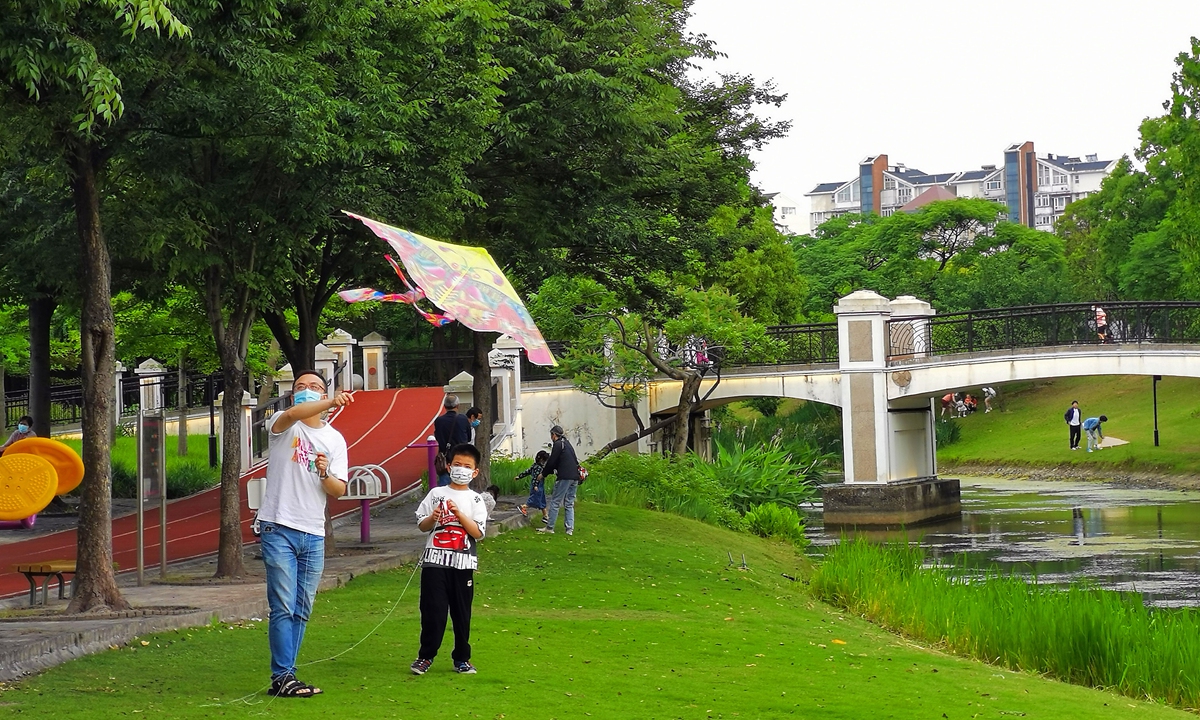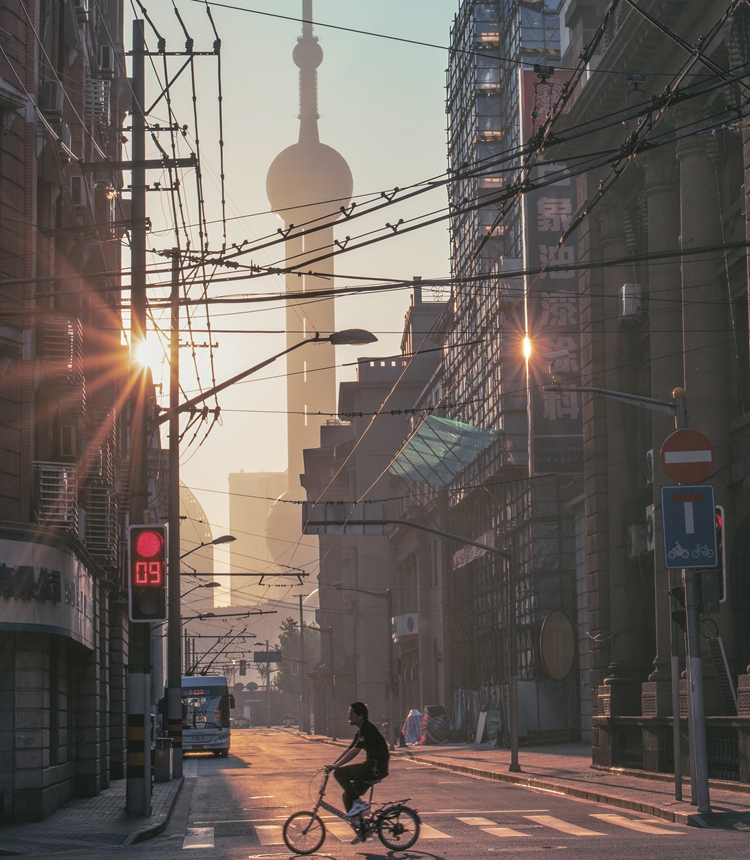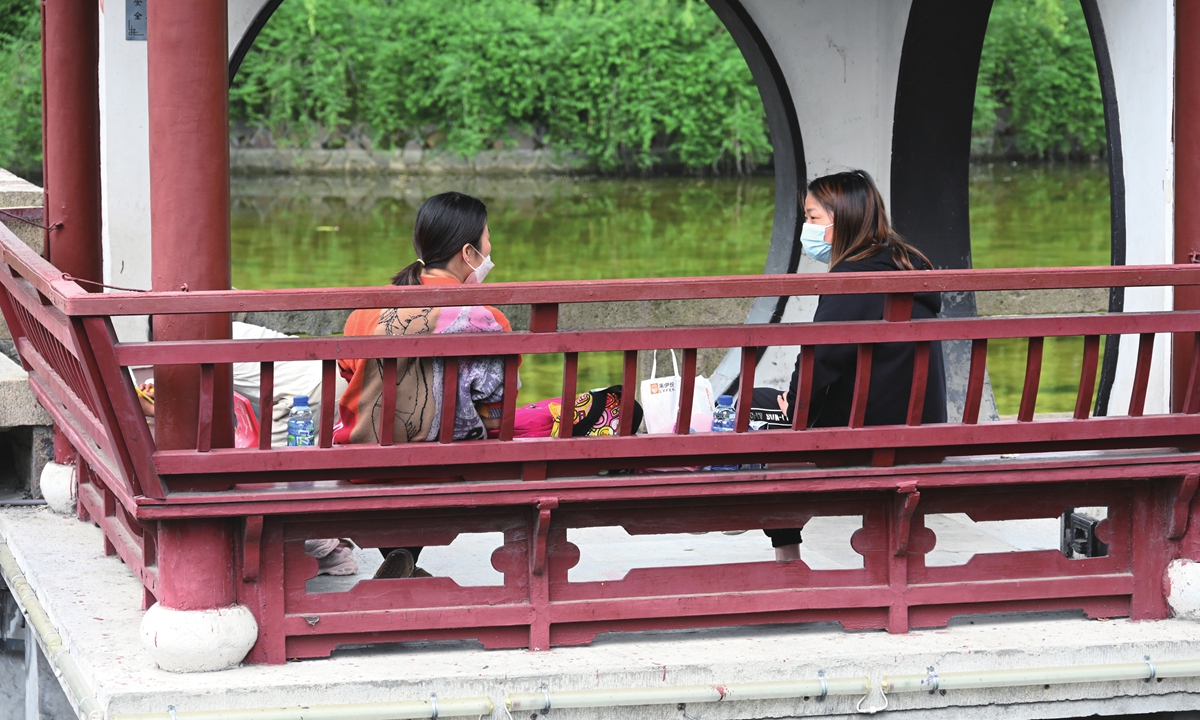
Residents fly kite in Songjiang district, Shanghai on May 22, 2022. Photo: VCG
As many Shanghai residents have reported strained nerves and some have presented with psychological disorders in the current strict epidemic fight since late March, mental health support is never off-line. Residents in the megacity are helping each other through such difficulties and professional counseling services are currently sought-after, as many parts of the city are preparing for a return to normal.
Chinese search engine Baidu, in late April, recorded a huge spike in searches for "psychological counselling," and other related searches over the past 30 days increased by 253 percent year-on-year.
The global prevalence of anxiety and depression increased by 25 percent in the first year of the COVID-19 pandemic, according to a scientific report released by the World Health Organization (WHO) on March 2.
Social disconnection seems to bring another public health crisis, as loneliness, fear, loss and disorder became a defining feature of isolated days for many, experts said.
Health professionals highlighted the significance of tracking rates of depression, stress, and anxiety across vulnerable populations, including health workers, while spontaneous, self-help and official mental health services and support all work in concert to offer assistance.
Governments ramped up their efforts to tackle the mental health consequences by providing psychological resources to hospitals and residential communities while some self-help lines were also opening longer.
Fear and loneliness attacks
"When loneliness kicks in, when I heard of many helpless stories across social media and more sickness, I developed a strong sense of hopelessness," Wu Ying (pseudonym), a 22-year-old graduate student in Shanghai who lives alone, told the Global Times. In the latest wave of the virus in Shanghai, a few students in Wu's college got infected.
Wu's internship and postgraduate applications were disturbed and postponed due to the COVID-19, which caused her serious anxiety and "difficulty to breathe," and she was often scratching herself." She suffered from insomnia and would have dreams of successfully scrambling for vegetables in short supply from online apps.
She felt like life was getting out of control. Looking at the little turtle she raised at home, the only being she could speak with over 45 days, she often cried. She decided to seek help from a psychiatrist.
During the almost two months of staying home, people were isolated and social circles faded. Loneliness, fear of infection and suffering for oneself and for loved ones, grief after bereavement and financial worries have also been cited as stressors leading to anxiety and depression.
Among health workers, exhaustion has been a major trigger for suicidal thoughts, according to a scientific report by WHO in March.
Shanghainese social media posts are sometimes recording gut-wrenching emotions: fear of infection and the long-term effects of the virus; anxiety over unverified information spreading on the internet; and remorse and guilt for not being able to soothe children.

Shanghai Photo: VCG
One major explanation for the increase is the unprecedented stress caused by the social isolation resulting from the pandemic. Linked to this were constraints on people's ability to work, seek support from loved ones and engage in their communities, according to the report of the WHO.
"In stressful situations, most people have temporary mood swings, such as anxiety, fear or depression. The conditions in most people are mild and temporary. However, a small number of psychological symptoms are more severe and last longer, requiring treatment from psychological services or even medication," Chen Jun, a senior expert of the Clinical Research Center at the Shanghai Mental Health Center, explained to the Global Times.
The Shanghai Mental Health Center has seen demand for counselling services rise since late March. The number of calls to the hotline has doubled to as many as 20 calls per line a day, with the most common problems being about anxiety and fear of the virus, said Chen.
Two groups are primary service seekers: psychiatric patients whose treatment was disturbed due to the COVID-19, and infected or quarantined local residents who developed psychological issues, according to Chen, adding that this round of the epidemic makes it clear for us how much mental health support is needed, said Chen.
He suggested that front-line healthcare workers are also their key targets as they are a vulnerable group for their exposure to higher risks of being infected with the virus and a high workloads, as well as being far apart from their families.
Many healthcare workers suffered from insomnia and exhaustion in overtime work against the virus, or guilt in case of getting infected which would further lead their co-workers and family to be all quarantined. These are true attacks to their mental state," Chen said.
Self-help groups and helplines
Trapped at home, Shanghainese found their own ways to deal with their emotions.
Sophy Han, a psychology graduate, created a "happy diet recipe" and "home games" and shared them with neighbors in her community to encourage people to try them together and cheer up each other.
The games include meditation, yoga, aerobics and listening to classical music.
"We call on neighbors to do these activities together to help combat loneliness and depression. Two weeks ago, we came to read a psychology book together and then talked with our young neighbors in a virtual group about what we learnt from the book to scientifically treat our negative emotions," Han told the Global Times.
"We know that isolation life is truly tough but we must rely on our own strength to get out of the trap of negative emotions. We need to stand together against the virus," said Han.
Some psychotherapy societies and organizations seized on the opportunity to roll out online psychological consulting courses, sometimes free of charge. They created platforms to connect help-seekers with therapists virtually.
Since the latest outbreak in Shanghai, many mental helplines in the city have been extended to 24 hours.
A 24-hour psychological support hotline in Shanghai's Jing'an district has adopted about 1,170 professional counselors to provide professional support to medical and community workers and residents.
"The most impressive case was that of a community worker who called us less than three minutes after the line was released and talked about difficulty in getting understanding from residents in his community. We talked to him for half an hour, recognizing his efforts, showing our empathy and giving professional advice, and gradually eased his negative feelings," He Yanhong, the hotline's counsellor team leader, told the media.
Psychological support for infected patients
From the early stage of the epidemic, the Shanghai Mental Health Center sent nine teams to provide services in makeshift hospitals and some COVID-19 designated hospitals.
Each team was composed of a psychiatrist and a psychotherapist. Every night, they discussed the difficult cases and exchanged advices, Chen told the Global Times. Currently, seven teams have completed their tasks and turned online to continue the consulting services.
In the makeshift hospitals, large posters of the Shanghai mental health hotline are prominently displayed while videos of epidemic prevention and psychological health are played on large screens. Chen and his colleagues have also developed a psychological screening system for healthcare workers and COVID-19 patients, using clinical assessment scales to screen and intervene in cases of people with key psychological problems.
One-on-one tailored service is also available with various methods applied, including mindful meditation, relaxation training, supportive psychotherapy and medication for those with severer symptoms.
Chen shared his experience of successfully treating the psychological problems of an 80-year-old patient who developed mild COVID-19 symptoms such as fever but was in a basically good physical condition.
After being sent to the makeshift hospital, the elderly was nervous and acted abnormally, scrubbing almost everything around her, refuted the treatment, and stopped talking to anybody.
"I found she might have a certain degree of delirium as she felt strongly unsafe in the cabin and said that those who came to support her were 'trying to kill her for money.' She had a strong fear of the virus and developed abnormal anxiety and depression under stress which led to psychotic symptoms such as delusion of persecution," Chen told the Global Times.

Shanghai residents chill at Guhua Park in the city on May 16, 2022. Photo: VCG
"This case reminds us of the importance of educating the people about viruses and protection. Overcoming anxiety and fear from the unknown is very important," said Chen.
Apart from mental health, the issue of "COVID-19-related discrimination" during the pandemic also deserves attention, experts warned. It is necessary to provide the public with appropriate psychological assistance, education and strategies to deal with discrimination against infection, Chen Runsen, assistant professor at the Vanke School of Public Health of Tsinghua University, told the Global Times.
"It demonstrates that the public still has a strong sense of shame on mental health problems. But we hope the public can better understand COVID-19 patients to eliminate discrimination and fear. If they find themselves trapped in negative emotions, they should seek professional psychological help as soon as possible," Chen noted.
For some patients who seriously endanger their own safety or the well-being of others, they must go to psychiatric institutions for further formal treatment, he warned.
Apart from mental health, the issue of "COVID-19-related discrimination" during the pandemic also deserves attention, experts warned. It is necessary to provide the public with appropriate psychological assistance, education and strategies to deal with discrimination against infection, Chen Runsen, assistant professor at the Vanke School of Public Health of Tsinghua University, told the Global Times.
"It demonstrates that the public still has a strong sense of shame on mental health problems. But we hope the public can better understand COVID-19 patients to eliminate discrimination and fear. If they find themselves trapped in negative emotions, they should seek professional psychological help as soon as possible," Chen noted.
For some patients who seriously endanger their own safety or the well-being of others, they must go to psychiatric institutions for further formal treatment, the expert warned.


